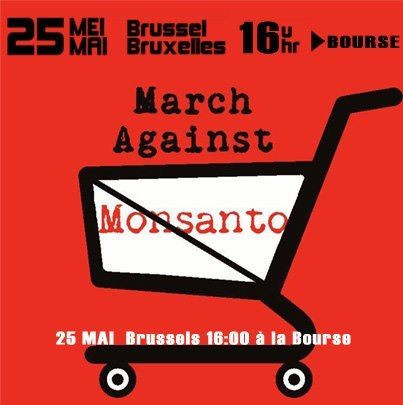
Protestors held rallies and marches in cities across the US and as many as 40 other countries today against the biotech giant Monsanto to call attention to the dangers of genetically modified organisms (GMOs) and to patent laws which they say give the corporation a monopoly on the market. Marchers are pushing for a law mandating the labeling of genetically modified products as well as further scientific research into their potential health effects. The Food and Drug Administration says there is no difference in safety between genetically modified foods and organic ones.
Protestors also seek to overturn the Farmer Assurance Provision (or what they have dubbed the "Monsanto Protection Act"), a six-month-long provision designed to limit courts' ability to stop Monsanto or farmers who buy their seeds from growing or harvesting crops which grow from genetically modified seed, even if courts finds evidence of potential health risks.
RELATED:
Brad Pitt Thinks He Suffers From Face Blindness
Joe Arpaio Racially Profiled Latinos, Judge Rules
Venezuelan President To Arm New Workers' Militia; Does Maduro Fear The Military?
Genetically modified seeds sold by Monsanto are engineered to resist insecticides and herbicides, add nutritional benefits, and improve crop yields, among other things.
"March Against Monsanto" comes after the Senate moved not to consider a bill which would have allowed states to require the labeling of genetically modified foods.
At the beginning of May, the US Supreme Court ruled in favor of the corporation, which had sued 75-year-old Indiana farmer Hugh Bowman for the illegal copying of a patented product. Bowman, who usually plants the corporation's soybean, had signed a licensing agreement prohibiting him from using regenerated seed for future use. In seeking a "cheap source of seed" one year, however, he bought harvested soybeans from a local grain elevator and planted them, then used the second and third generations of the elevator seed for eight more crop yields, according to NPR. He was found to have violated his licensing agreement.
The corporation is known for its aggressiveness in protecting its dominance of the market for genetically altered crops. Roughly 95 percent of all soybeans and 80 percent of all corn grown in the US are from Monsanto's patented genes.
Monsanto Co. told the Associated Press on Saturday that its seeds improve agriculture by helping farmers produce more from their land while conserving water and energy resources. Its seeds are about three times more expensive than regular seeds, leading some farmers to try to use regenerated seed to save money.
© 2025 Latin Times. All rights reserved. Do not reproduce without permission.




